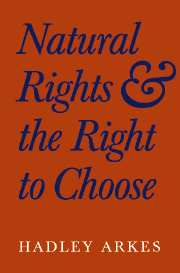Book contents
- Frontmatter
- Contents
- Acknowledgments and Dedication
- ONE Introduction: Backing into Treason
- TWO The Drift from Natural Rights
- THREE On the Things the Founders Knew – and How Our Judges Came to Forget Them
- FOUR Abortion and the “Modest First Step”
- FIVE Antijural Jurisprudence
- SIX Prudent Warnings and Imprudent Reactions: “Judicial Usurpation” and the Unraveling of Rights
- SEVEN Finding Home Ground: The Axioms of the Constitution
- EIGHT Spring Becomes Fall Becomes Spring: A Memoir
- Postscript, January 2004
- Index
THREE - On the Things the Founders Knew – and How Our Judges Came to Forget Them
Published online by Cambridge University Press: 05 June 2012
- Frontmatter
- Contents
- Acknowledgments and Dedication
- ONE Introduction: Backing into Treason
- TWO The Drift from Natural Rights
- THREE On the Things the Founders Knew – and How Our Judges Came to Forget Them
- FOUR Abortion and the “Modest First Step”
- FIVE Antijural Jurisprudence
- SIX Prudent Warnings and Imprudent Reactions: “Judicial Usurpation” and the Unraveling of Rights
- SEVEN Finding Home Ground: The Axioms of the Constitution
- EIGHT Spring Becomes Fall Becomes Spring: A Memoir
- Postscript, January 2004
- Index
Summary
The city of Cincinnati can be an engaging place, but federal judge Arthur Spiegel also found, in the mid 1990s, that it could be quite a vexing place. The city council of Cincinnati passed what was called the Human Rights Ordinance of 1992, which barred virtually all species of discrimination – including discrimination on the basis of “Appalachian origin.” But the bill also encompassed a bar on discriminations based on “sexual orientation.” That kind of bill, in other places, had been turned into a club to be used against evangelical Christians, who might refuse, on moral grounds, to rent space in their homes to gay or lesbian couples. And so a movement arose in Cincinnati, modeled on a similar movement in Colorado, to override the ordinance passed by the council: This would not be a referendum merely to repeal the law, but a move to amend the charter of the municipal government and remove, from the hands of the local legislature, the authority to pass bills of this kind. In effect, it was a move to override an ordinary statute by changing the constitution of the local government.
The amendment did not seek to make homosexual acts the grounds for criminal prosecutions. It sought rather to bar any attempt to make gay and lesbian orientation the ground for special advantages or quotas or the standing of a preferred “minority.” The framers objected to the tendency to treat gays and lesbians on the same plane as those groups that suffered discriminations based on race, religion, or gender.
- Type
- Chapter
- Information
- Natural Rights and the Right to Choose , pp. 34 - 71Publisher: Cambridge University PressPrint publication year: 2002

